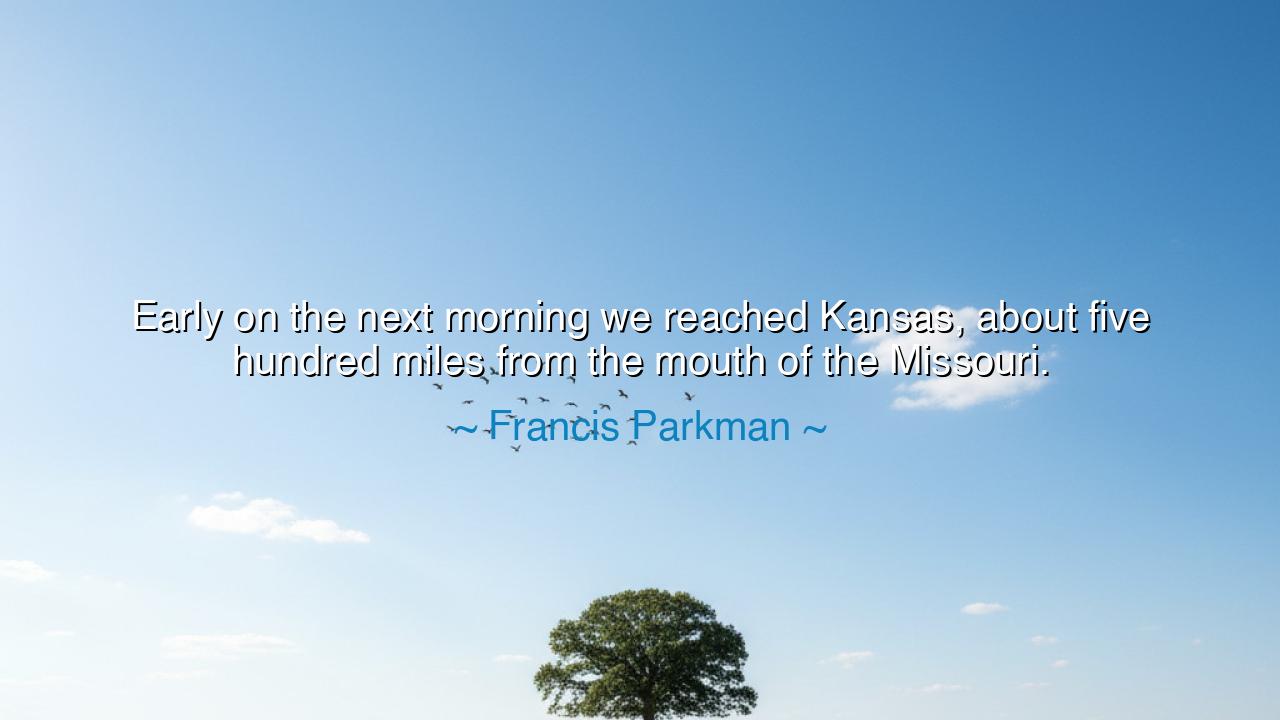
Early on the next morning we reached Kansas, about five hundred
Early on the next morning we reached Kansas, about five hundred miles from the mouth of the Missouri.






From the hand of Francis Parkman, the historian who wandered the wilderness to record the heart of a young nation, comes this simple yet powerful line: “Early on the next morning we reached Kansas, about five hundred miles from the mouth of the Missouri.” Though plain in its telling, it is heavy with the weight of history. It is not merely a note of travel, but a marker of the frontier spirit, of distance measured in hardship, and of the courage of those who ventured into the untamed land.
When Parkman writes “we reached Kansas,” he names not simply a place on a map, but the threshold of a new world. For in the days when he traveled, Kansas was not yet the settled land it would become, but part of the vast frontier where wilderness still ruled. To reach it was to cross into mystery, to step from the familiar into the unknown. His words remind us that every journey worth taking brings us to such thresholds: points where the old world ends, and the new, with all its dangers and promises, begins.
The measure of “five hundred miles from the mouth of the Missouri” is more than a geographical note—it is a testament to endurance. In Parkman’s time, such distance was no small matter. It was days of riding, nights under stars, the strain of muscle, the risk of illness, and the constant edge of danger. To write those words was to affirm that progress had been hard-won, each mile carved from sweat and uncertainty. In this way, the line stands as a parable for all undertakings: the true worth of distance lies not in its number, but in the struggle that brought us there.
Consider the explorers Lewis and Clark, who set forth decades before Parkman, tasked with mapping the Louisiana Purchase. Each league they marked upon their journals was soaked with effort and peril—storms on the rivers, hunger, sickness, and the unknown tribes they met along the way. Their distances, like Parkman’s, were not abstractions but lifelines, proof that progress had been made against the enormity of the continent. Such journeys remind us that all great achievements are measured not merely in miles or days, but in the resilience of the human spirit.
Parkman’s words also reveal the spirit of observation. He was not only a traveler but a chronicler, one who sought to preserve the sense of place and distance for those who would never see it. In this, his journey becomes more than his own; it becomes ours as well. Through his sentence, we walk beside him into the dawn, feeling the weariness of the trail and the quiet satisfaction of having arrived somewhere new. His record transforms personal experience into collective memory, ensuring that the courage of the frontier is never lost to silence.
From this, a lesson shines forth: progress is often quiet, often simple, yet always profound. A milestone may look small when spoken—“we reached Kansas”—but behind it lies untold effort, risk, and persistence. So too in our lives: the simple sentences of progress—“I finished my work,” “I kept my promise,” “I reached my goal”—carry within them the hidden story of endurance. To recognize this is to honor both our own journeys and those of others.
Practically, let us learn to honor the distances we travel, both great and small. Record your milestones, however humble, and look back on them not with pride alone but with gratitude for the strength that carried you. When you hear another speak of their own “five hundred miles,” listen deeply, for behind their words lies a struggle you may not see. In this way, we live as both travelers and chroniclers, building not only our own journeys but a shared legacy of perseverance.
Thus, the line of Parkman endures: “Early on the next morning we reached Kansas.” It is a whisper of history, yet also a roar of courage. It tells us that every step forward, every mile endured, carries us closer to the horizon of possibility. And though the words are plain, they teach us this eternal truth: progress, however quietly spoken, is always heroic.






AAdministratorAdministrator
Welcome, honored guests. Please leave a comment, we will respond soon